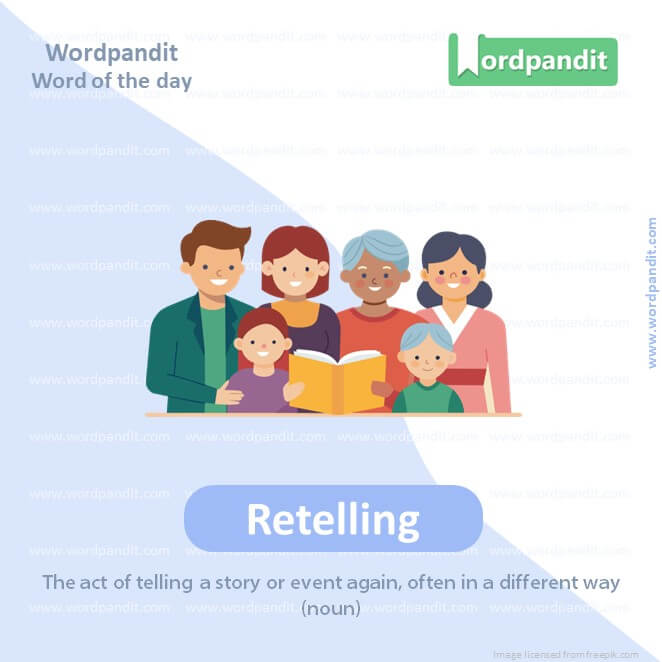Daily Vocabulary Words: Enhance Your Lexicon with Leading Newspapers & Publications
Welcome to the Daily Vocabulary section at Wordpandit!
Our mission is straightforward: to bring you essential vocabulary words featured in top newspapers and publications worldwide. By focusing on words you’ll encounter in renowned sources, we aim to help you enhance your vocabulary effectively and practically.
Our selection includes words from:
– The New York Times
– The Washington Post
– Scientific American
– BBC
– The Guardian
– Psychology Today
– Wall Street Journal
– The Economist
– The Hindu
– The Times of India
– The Economic Times
– Hindustan Times
– Live Mint
– The Indian Express
– And many more.
We are committed to your vocabulary development. Simply visit this section regularly and explore the daily posts. This is your go-to repository for commonly used words, providing significant practical benefits by familiarizing you with vocabulary from the leading publications listed above.
Make it a habit to visit our website daily and expand your lexicon with words from top newspapers and publications.

WORD-1: Unequivocally
CONTEXT: In stark contrast to his email of 2021, Dr Mehta also unequivocally labelled the decolonisation movement in Bharat as an “insidious” project with an “exclusionary political agenda”.
SOURCE: Indian express
EXPLANATORY PARAGRAPH: Imagine you are sure about something, like knowing for certain that chocolate is your favorite ice cream. When you’re that sure, you’re being “unequivocal.” “Unequivocally” means being completely clear and without any doubt.
MEANING: In a clear and unambiguous manner (adverb).
PRONUNCIATION: un-ee-KWIV-uh-klee
SYNONYMS: absolutely, definitely, clearly, plainly, categorically
USAGE EXAMPLES:
1. She stated unequivocally that she was not interested.
2. The results unequivocally showed that the treatment was effective.
3. He unequivocally denied the allegations.
4. The film was unequivocally a success.

WORD-2: Frenzied
CONTEXT: I find it both amusing and convenient on the part of well-read and informed individuals such as Shri Mehta to take the position that while their movements are broad-minded, purely academic, neutral and ideological, the counterviews are frenzied and parochial political movements driven by a cynical lust for power.
SOURCE: Indian express
EXPLANATORY PARAGRAPH: Imagine how it feels when everyone at a party starts dancing and jumping around super fast and excited. That’s “frenzied.” It means very wild and uncontrolled.
MEANING: Wildly excited or uncontrolled (adjective).
PRONUNCIATION: FREN-zee’d
SYNONYMS: frantic, wild, feverish, hysterical, frenetic
USAGE EXAMPLES:
1. The crowd was in a frenzied state after the concert announcement.
2. She was working in a frenzied rush to meet the deadline.
3. The market was a frenzied scene of shoppers grabbing the best deals.
4. The news caused a frenzied reaction on social media.
WORD-3: Unfettered
CONTEXT: This is the BJP’s predicament. After enjoying two consecutive terms with an unfettered majority, the BJP can now return to a third term with crutches. The outcome presents it with three complicated features.
SOURCE: New York Times
EXPLANATORY PARAGRAPH: Imagine playing in a big, open field where you can run anywhere you want without anything blocking you. “Unfettered” means being free with no restrictions at all.
MEANING: Not confined or restricted; free from restraints (adjective).
PRONUNCIATION: un-FET-erd
SYNONYMS: unrestricted, free, unbounded, unconfined, liberated
USAGE EXAMPLES:
1. He enjoyed the unfettered freedom of his summer holidays.
2. The discussion was an opportunity for unfettered conversation.
3. Her imagination was unfettered, leading to creative ideas.
4. They called for unfettered access to all government records.

WORD-4: Retelling
CONTEXT: Through my mother’s beautiful retelling of our family’s story, I felt belonging.
SOURCE: New York Times
EXPLANATORY PARAGRAPH: Imagine telling your friend about a movie you just saw, but you change some parts to make it more exciting. “Retelling” is when you tell a story again, sometimes in a different way.
MEANING: The act of telling a story or event again, often in a different way (noun).
PRONUNCIATION: ree-TELL-ing
SYNONYMS: recounting, narrating, relating, reciting, replaying
USAGE EXAMPLES:
1. Her retelling of the incident was more dramatic than the original event.
2. Each retelling of the legend varies slightly from the other.
3. The book is a retelling of a classic fairy tale.
4. His retelling captured the audience’s imagination.
WORD-5: Absurdly
CONTEXT: After Donald Trump was found guilty of 34 felony counts in a Manhattan court, conservatives — from Marjorie Taylor Greene to George Santos to the Heritage Foundation — began posting upside-down American flags on X in solidarity with the “political prisoner,” as Trump absurdly styles himself.
SOURCE: New York Times
EXPLANATORY PARAGRAPH: Imagine seeing a dog walking on two legs wearing a hat. That would be really silly and not normal, right? “Absurdly” means in a way that is silly or doesn’t make sense.
MEANING: In a ridiculous or extremely unreasonable manner (adverb).
PRONUNCIATION: ab-SURD-lee
SYNONYMS: ridiculously, preposterously, laughably, insanely, illogically
USAGE EXAMPLES:
1. The prices at the store were absurdly high.
2. He was dressed absurdly for the formal event.
3. The idea was absurdly simple yet effective.
4. They laughed absurdly at the smallest jokes.

WORD-6: Insurrectionists
CONTEXT: It was the same upside-down symbol that insurrectionists carried to the Capitol on Jan.
SOURCE: New York Times
EXPLANATORY PARAGRAPH: Imagine a group of people in a story who try to fight against the king to change the rules. “Insurrectionists” are those people who try to rise up and fight against the government.
MEANING: People who rebel against the authority of a state or government (noun).
PRONUNCIATION: in-sur-REK-shuh-nists
SYNONYMS: rebels, revolutionaries, mutineers, agitators, anarchists
USAGE EXAMPLES:
1. The insurrectionists seized the radio station.
2. Government forces captured the insurrectionists.
3. The plot was led by a group of insurrectionists.
4. Historical accounts detail the rise of insurrectionists in the region.

WORD-7: Felonious
CONTEXT: Now that it’s being used to show support for a felonious ex-president, Alito will have an even harder time trying to pretend he’s oblivious about its meaning.
SOURCE: New York Times
EXPLANATORY PARAGRAPH: Imagine someone doing something really bad, like stealing something very important. “Felonious” is a word used to describe actions that are serious crimes.
MEANING: Pertaining to or constituting a major crime (adjective).
PRONUNCIATION: feh-LO-nee-us
SYNONYMS: criminal, illegal, unlawful, illicit, nefarious
USAGE EXAMPLES:
1. He was charged with felonious assault.
2. The felonious actions led to his arrest.
3. They were involved in a felonious scheme.
4. The document revealed felonious conduct.
WORD-8: Oblivious
CONTEXT: He was oblivious about the symbolism of the “Appeal to Heaven” Pine Tree Flag, he claimed.
SOURCE: New York Times
EXPLANATORY PARAGRAPH: Imagine you are so focused on watching your favorite cartoon that you don’t notice someone calling you to dinner. “Oblivious” means not being aware of what is happening around you.
MEANING: Not aware of or not concerned about what is happening around one (adjective).
PRONUNCIATION: uh-BLIV-ee-us
SYNONYMS: unaware, unconscious, heedless, unmindful, inattentive
USAGE EXAMPLES:
1. She was oblivious to the time, missing her appointment.
2. He walked past, oblivious to the chaos around him.
3. They were oblivious to the fact that they were being watched.
4. She remained oblivious to the growing problems.
WORD-9: Righteousness
CONTEXT: “These conservative Catholic and evangelical Christian operators believed they were fighting the biggest moral battle of the modern age, and forced America to debate on their terms,” they wrote. “But despite their public appeals, they did not convince broad swaths of Americans of the righteousness of their cause.
SOURCE: New York Times
EXPLANATORY PARAGRAPH: Imagine always trying to do what is right, like sharing your toys and helping others. “Righteousness” means behaving in a morally right or just way.
MEANING: The quality of being morally right or justifiable (noun).
PRONUNCIATION: RYE-chus-ness
SYNONYMS: virtue, morality, integrity, decency, uprightness
USAGE EXAMPLES:
1. He acted with righteousness in defending the weak.
2. Her righteousness was evident in all her dealings.
3. The leader preached about the importance of righteousness.
4. They admired his righteousness and fairness.
WORD-10: Sprawling
CONTEXT: The maker of OxyContin is one in a long line of companies that have turned Chapter 11 into a legal Swiss Army knife, tackling problems that are a mismatch for its rules. Managing costly and sprawling litigation through bankruptcy can be well intentioned.
SOURCE: New York Times
EXPLANATORY PARAGRAPH: Imagine a big city with buildings and streets spreading out in every direction with no clear plan. “Sprawling” describes something that spreads out over a large area, often in a messy way.
MEANING: Spreading out over a large area in an untidy or irregular way (adjective).
PRONUNCIATION: SPRAWL-ing
SYNONYMS: spread-out, extended, sprawling, rambling, expansive
USAGE EXAMPLES:
1. The sprawling cityscape was visible from the hilltop.
2. They lived in a sprawling ranch in the countryside.
3. The festival took place on a sprawling piece of land.
4. His notes were sprawling across the desk.
Vocabulary Words in English
In the kaleidoscopic world of language, the thread of ‘vocabulary words in English’ weaves a rich tapestry. These words, the building blocks of communication, lend themselves to the eloquence and effectiveness of our speech and writing. Despite their significance, mastering ‘vocabulary words in English’ can sometimes be daunting, but with strategic approach, the process can be greatly simplified.
Learning ‘vocabulary words in English’ goes far beyond rote memorization. It requires an integrated approach that encompasses understanding and using the words. Consuming a diverse range of English materials such as novels, news articles, movies, music, and online content can acquaint you with words in actual use, helping you perceive both their meaning and usage in different contexts.
Furthermore, incorporating memory-enhancing techniques can add impactful strides to your journey of mastering ‘vocabulary words in English’. Methods such as the Leitner System or flashcards can bolster the memory retention of these words. Meanwhile, using mnemonic devices, associating words with unique stories or images, can help in retaining the ‘vocabulary words in English’ in long-term memory.
Another key to deciphering ‘vocabulary words in English’ is by practicing them in real-world contexts. Incorporate the new words into your daily conversations, written emails, or social media posts. Not only will this reinforce the meanings and applications, but also boost your confidence in using them.
In essence, understanding ‘vocabulary words in English’ is a continual journey that calls for persistent commitment, diverse learning approach, and ample practice. As you indulge in this exploration, you will find your command over the ‘vocabulary words in English’ becoming stronger, leading to more confident and dynamic communication. Remember – in the world of language, words are your faithful companions, and the more you engage with them, the more they’ll reveal their richness to you.













